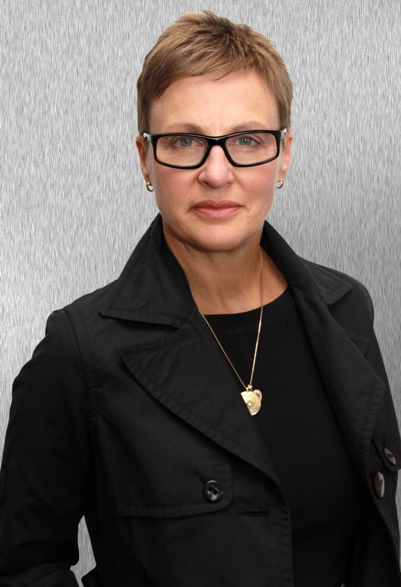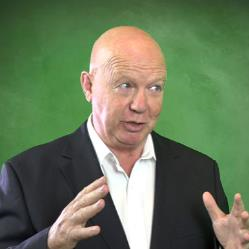
"A poor sales company culture and lack of sales strategy makes it tough for salespeople to sell" - Interview by John Smibert
As Sue Barrett said in our last interview "Nothing happens until somebody sell something". And unless our company has a culture and a clear sales strategy that directs and fully supports our sales team then sales are impacted and company revenues and profitability suffer. In fact I believe the whole company needs to operate as a sales machine.
I asked sales leadership guru Sue Barrett how organisations should go about building a sales culture.

Sue told me "there is an illusion that highly successful people have high self-control, but they actually don't. What they have is really good habits that support them".
For the company to be successful in growing their revenues they need to ensure that a common set of habits, behaviours, skills and processes are embedded across the sales organisation - and beyond - and this needs to be supported by clear, succinct sales strategy.
"We need to start looking at how do we get sustainable change and the right behaviours happening, firstly with the sales team - and the logic that I'll share with you now - will also stem back into other parts of the organisation".
As an example we often send salespeople to a good training course, some good techniques, tools, resources, whatever it is, and they then go back into the exact same environment and the same routine - nothing will change because we have not enabled the change that the training assumed.
Sue went on to outline how these cultural changes should be implemented. See the full discussion below for the details.
***********
Sue is an authoritative thought leader and an accomplished author on the selling profession. She's also founder and CEO of Barrett and SalesEssentials.com.
Interview
John: Hello, I've got Sue Barrett with me again - welcome back, Sue!
Sue: Thank you, John!
John: Sue, we recently had a discussion about selling is everybody's business inside the organisation. We all need to work together towards the ultimate sale, we've all got a role to play in that. That made me start thinking about another topic, and that's around getting consistent behaviour in an organisation around sales, if you like, build the culture. Let's talk about that a little bit. How do you think organisations should go about building that culture, and why is it important?
Sue: Firstly, we have culture but we also have strategy, and that strategy will dictate the
standards of behaviour, skills, knowledge and those sorts of things that we need to have.
 John: I've seen a lot of strategies dictate, but it doesn't happen in the field.
John: I've seen a lot of strategies dictate, but it doesn't happen in the field.
Sue: No, exactly, and this is what happens, there's often a disconnect. People might go along, let's say salespeople for example might do the annual sales training event, the strategy is rolled out, and then you're kind of left, "Off you go, see you next year!" in the sense of getting feedback from them in a year's time which is too late. So, if we want to start looking at how do we get sustainable change and the right behaviours happening, firstly with the sales team - and the logic that I'll share with you now will also stem back into other parts of the organisation - is that if we send our salespeople out, we send them on a good training course, some good techniques, tools, resources, whatever it is, and they then go back into the exact same environment and the same routine, nothing will change.
John: Yes, I've seen it a thousand times.
Sue: Exactly. So, what we have to do as businesses, whether it's a cultural transformation, skills transformation, sales leaders, it doesn't matter, is that we need to change the routine and we need to change the environment. Now, we don't have to do wholesale change, but we have to change how we're going to do things so that when I step back into the new world after the training, that the environment is already prepared for me to now conduct my activities in the new way. Now, it's not going to happen easily, and we need that support from coaches and managers and people out there providing the coaching and support for people to make that change, but we have to change the environment and change the routines.
John: Okay. And in doing so I guess we need then to monitor whether people are actually deploying the new behaviour, and then have some sort of corrective mechanism in place to bring them back online as they...
Sue: That's right. It's got to be really clear about what we're accountable for and what standards we need to operate in. We have this role clarity pyramid concept that we work at, and it starts with purpose, then you're looking at accountabilities and so on and so forth, all the way down to what resources and framework have we got in place to help people be successful.
 John: Right.
John: Right.
Sue: It is quite an engineering feat in terms of accounting for that, but I find most companies have all of the things in place, just how we're now going to adjust them to take on board the new way we would like to sell around here, and then helping each other actually navigate our way through the processes.
John: I've seen it so many times where some organisations can drive that change very well, but so often it fails, and it tends to be seen as a project to implement a change that really doesn't get to the grass roots of why we're doing it.
Sue: That's right, and so there's got to be purpose and meaning behind it. The other thing I think there's this illusion that highly successful people have high self-control, but they actually don't. What they have is really good habits that support them, and they've put in place those habits to actually... they don't have to think about them very much because they're already in place. That's what we're trying to do here is put in place good habits that are going to reinforce the right behaviours, the right activities, the right standards that we want.
So, this illusion of, "I'm in control," actually isn't... Well, it's an illusion. It's, "I've got good habits that underpin and support me, because I've put the effort in to build those out over time," and it's a long-term gain. The challenge with a lot of sales businesses, in the US particularly but also creeping here, is the short-term, quarter by quarter focus, numbers focused. You cannot coach numbers and results, you can only coach and develop behaviours and activities.
John: And you need to monitor the leading and leaning indicators, to be able to understand what's happening there and drive that change, not wait for the results and then decide, "Hey, we've got a problem."
Sue: Yes. Our culture, our strategy, our purpose as an organisation will in fact dictate how we sell around here or how we want to sell around here, and then we must engineer it in such a way that it will happen, rather than just on a wing and a prayer, hoping people after that sort of hot bath of ~hurrah, hurrah~ will get it and off they go.
John: Yes. The old motivation speeches, right?
Sue: Don't waste your money.
John: Don't waste your money. Thank you very much, Sue - great advice. Look forward to the next time we talk!
Sue: Thank you!
****************
Past interviews with Sue Barrett:
***************

Your Invitation: I invite you to join the Sales Leader Forum group on LinkedIn where you can experience informative discussions with your peers and sales thought leaders on subjects like the one we have discussed here. I also invite you to subscribe to the
- Sales Leader Resource Centre here
- Sales Leader YouTube channel here (300+ sales leadership videos)
Please Share: If you valued this article, please share via your Twitter, LinkedIn, Google+ and Facebook social media platforms. I encourage you to join the conversation or ask questions. So feel free to add a comment on this post - I promise to respond. If inclined please follow my LinkedIn post page here.
Want to touch base? If you have questions please feel free to contact me - email: john.smibert(at)salesleaderforums.com, Phone: +61 404857893 or Skype: john.smibert